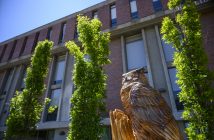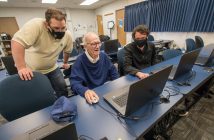The research interest of Psychology Professor Joseph A. Camilleri, Ph.D., in aggressive behavior developed early in his career. “After completing my bachelor’s in psychology, I worked as a research assistant at a maximum security psychiatric facility. The quality work done by this group of researchers inspired me to pursue graduate training in both evolutionary and forensic psychology,” says Dr. Camilleri.
He has published numerous journal articles and participated in many presentations about interpersonal conflict, particularly sexual conflict in relationships. Dr. Camilleri’s areas of research have included partner rape, psychopathy, developmentally disabled offenders and bullying.
“Understanding the causes of risky, aggressive behavior provides insight on how to best intervene, whether it’s preventing the onset of such behavior or minimizing the chances of reoffending,”
he says.
Using basic research, Dr. Camilleri stresses it is important to use sound theory and proper experimental design to understand what ultimately causes interpersonal conflict. He believes applying that research informs policies and programs that prevent or mitigate interpersonal conflict. “In addition to basic research, I consider evidence-based research to be of great value, and I have an interest in the application of scientific research toward program development and evaluation,” Dr. Camilleri says.
Building upon his expertise, Dr. Camilleri is heading a new forensic concentration in Westfield State’s master’s program in mental health counseling. This graduate program prepares students for jobs that address the mental health needs of offender populations. The curriculum is designed to offer specialized training in theory, assessment and treatment, and will provide students with applied experience in criminal justice settings. “As director of this concentration, my goal is to teach students how to use best practices in working with forensic populations. Also, through student research, we hope to graduate well-rounded students who are scientifically literate practitioners.”




